- Home
- Jessica Verdi
My Life After Now Page 21
My Life After Now Read online
Page 21
I don’t know how she looked at that gorgeous, tiny, healthy baby girl and saw anything other than perfection, but Lisa took one look at her and freaked, just as she had with me time and time again. I finally came to realize that it wasn’t me that wasn’t good enough; it was her. She would never be a mother, and she knew it.
I thought about it a lot, and my theory was that all Lisa really wanted was someone to love her. But when her drug addiction and severe lack of any form of compassion prevented that, she decided she would have a baby. In her mind, her baby would love her, no matter what. And who knows, that may have been true. But the variable in the equation was Lisa. After she gave birth, it became clear that she simply wasn’t capable of loving the baby in return. And that posed a problem.
So Dad and Papa adopted her, and I finally gave her a name. Viola Freeman-Moore. She’d only been in the world a month and already it was impossible to imagine life without her.
• • •
After dinner, I walked Evan to his car.
“I’ll call you later,” he promised, and kissed me good-bye.
I watched his taillights disappear around the corner, and then looked down at the object in my hands. A stamped envelope, addressed to Lee Harrison, 177 Spring Street, Apt. 5B, New York, NY, 10012.
Inside was a single sheet of hot pink paper: a schedule for Roxie’s meetings. I slid it into the empty mailbox and flipped the little flag up.
Maybe Lee would never show up, but maybe he would. And if he did, we would be there to help him. Because, when it comes down to it, life really isn’t all that bad.
And of that I was absolutely positive.
HIV/AIDS at a Glance
What is HIV?
The human immunodeficiency virus (HIV) is a condition that breaks down the immune system so that the body is unable to fight off harmful diseases and infections. The virus is contracted via the sharing of bodily fluids including semen, vaginal fluids, blood, and breast milk.
What is AIDS?
Acquired immunodeficiency syndrome (AIDS) is the most advanced stage of HIV. Since HIV is the virus that initially infects the body, not everyone with HIV has AIDS, but everyone with AIDS has HIV.
Is there a cure?
There is currently no cure or vaccine for HIV or AIDS. However, early testing, care, and treatment (such as medication) can greatly slow the progression of the virus.
Where did HIV and AIDS come from?
Though no one knows the exact cause, genetic research indicates that HIV originated in Africa during the early 1900s. AIDS was first recognized in 1981 and has caused an estimated 30 million deaths (as of 2009). As of 2010, approximately 34 million people around the world are living with HIV.
Facts and Figures
• Though teenagers make up only 25 percent of the sexually active population, they account for nearly half (50 percent) of new sexually transmitted infection (STI) cases.
• Over 61,000 young people (ages 13–29) were estimated to be living with HIV in the U.S. in 2007.
• Young people (ages 13–29) accounted for 39 percent of all new HIV cases in the U.S. in 2009 (an extremely high percentage, considering the 15–29 age group makes up only 21 percent of the general U.S. population).
• Most young people with HIV/AIDS were infected via sexual contact.
• Nearly half (46 percent) of all high school students report having had sex.
• Twenty-six percent of female teens and 29 percent of male teens report having had more than one sexual partner.
• Twenty-two percent of teenagers reported using alcohol or drugs during their most recent sexual encounter.
• Thirty-nine percent of teens reported not using a condom during their most recent sexual encounter.
*Information collected from Gay Men’s Health Crisis, the Centers for Disease Control and Prevention, and the Kaiser Family Foundation.
HIV/AIDS Resources for Teens
Adolescent AIDS Program offers an extensive list of local HIV/AIDS counseling and testing services for young people around the United States.
• http://www.adolescentaids.org/youth/resource_nationwide.html
MTV’s It’s Your (Sex) Life website is an excellent resource for all things related to teen sexuality, including information on HIV/AIDS (and other STIs), teen pregnancy, and relationships.
• http://www.itsyoursexlife.com
Planned Parenthood has a comprehensive website as well as over 800 health centers around the United States. They are readily available to answer questions and provide quality, nonjudgmental testing and care.
• http://www.plannedparenthood.org/info-for-teens/
• 800-230-PLAN
Gay Men’s Health Crisis (GMHC) is “the world’s first and leading provider of HIV/AIDS prevention, care, and advocacy.” Based in New York City, they offer free testing, counseling, group meetings, healthcare, legal services, and youth programs. If you are not near NYC, you can utilize their website and hotline to find out about testing locations and services in your area.
• http://www.gmhc.org
• 800-243-7692
The Centers for Disease Control and Prevention (CDC) is a wealth of information for up-to-date HIV/AIDS information (including the latest statistics). An entire section of their website is dedicated to HIV/AIDS resources for youth, and they also run a national AIDS hotline (open seven days a week, twenty-four hours a day) that can answer any questions you may have and direct you to a nearby testing site.
• http://www.cdc.gov/hiv/youth/resources.htm
• 800-342-AIDS
An in-home HIV test (similar to an in-home pregnancy test) is also newly available for purchase at drug stores. Approved by the FDA in July 2012, the test consists of an oral swab that produces results in as little as twenty minutes.
MY LIFE AFTER NOW
Reader Discussion Guide
1. What do you think of the way Lucy reacts to the problems she faces at the start of the book? How do you think you would react to experiencing a similar string of bad days?
2. Discuss the role of theater in the book. How does Lucy’s love of theater help or hurt her throughout her journey?
3. When the lab technician Marie asks Lucy how she thinks she will react to a positive HIV result, Lucy doesn’t know how to answer. What do you think your response would be to the same question?
4. Think about the settings of the book. High school drama club, a progressive suburb, New York City. Do you think Lucy’s experience with HIV would have been different if she were from a different place or hung out in a different crowd? How so?
5. How does Lucy’s relationship with her fathers change throughout the book? What do you think of her fathers’ differing reactions to the news that their daughter has contracted HIV?
6. Do you agree with June that Lucy’s impulse to “run away” was learned from watching her absentee mother? Why or why not?
7. Even after taking health and sex education classes in school, Lucy and her friends are still pretty misinformed about the facts surrounding HIV/AIDS. Do you think you’re more informed about the subject than they were? Or, like Lucy and Evan, would you also have to do a lot of research in order to educate yourself about the virus? What more can be done to educate teens about HIV/AIDS?
8. Do you think Lucy should have done the “personal responsibility” assembly that her principal asked her to do? Why or why not?
9. Discuss Lucy’s relationship with Evan. Is Evan’s reaction to the news that his girlfriend has HIV understandable? If not, what should he have done differently?
10. Think about Lucy’s friendships with Max, Courtney, and Roxie. If you were Lucy’s friend, how would you help her through her challenging journey with HIV?
11. What do you think Lucy’s life will be like ten years after the book ends?
Acknowledgments
Like Lucy, for most of my teen years, I dreamed of someday getting to give a Tony Award acceptance speech, where I would laugh and cry and
thank everyone who helped me along the way. So here goes—my literary Tony speech. I’ll try to keep it short and sweet, before they start playing the music.
First and foremost, to my rock star agent Kate McKean, thank you for taking a chance on me and believing in Lucy’s story as much as I do. I wouldn’t be here without you.
To the incredibly awesome Sourcebooks Fire team: my amazing editor Leah Hultenschmidt, Aubrey Poole, and Kimberly Manley. Thank you so much for reading this story, loving this story, and working so hard to bring this story to the world. To Katie Casper, thank you for all your hard work on my beautiful cover.
To my friends Colleen and Michael, I’m still waiting for both of you to write those memoirs you’ve promised me. So get crackin’, homies.
To my family, Susan Verdi-Miller, Jim Verdi, and Robert Verdi, thank you for a lifetime of constant love and support, even during those moments where I may have lost my footing a bit.
To Paul Bausch, you’re the coolest, raddest, most awesomesauce husband ever. What more can I say? I love you.
To The New School Writing for Children Class of 2012—Alyson, Amber, Caela, Jane, Kevin, Riddhi, and Sona—you are the best. Special shout-outs to my beta readers, Dhonielle Clayton, Corey Ann Haydu, and Mary G. Thompson—you guys rock. To my creative writing instructor Tor Seidler, thank you for encouraging me to keep going with this story.
And finally, to Amy Ewing. “Thank you” doesn’t do it justice. I could not have written this book—or any of my books—without you. You are the best friend, critique partner, cheerleader, and wine-drinking Vampire Diaries viewing buddy a girl could ask for. I’m so lucky to get to be your friend.
About the Author
Jessica Verdi lives in Brooklyn, NY, and received her MFA in Writing for Children from The New School. Her favorite pastimes include singing show tunes at the top of her lungs (much to her husband’s chagrin), watching cheesy TV, and scoring awesome nonleather shoes in a size 5. She’s still trying to figure out a way to put her uncanny ability to remember both song lyrics and the intricacies of vampire lore to good use. Follow Jess on Twitter @jessverdi.

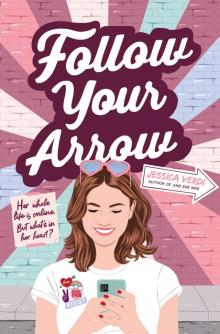 Follow Your Arrow
Follow Your Arrow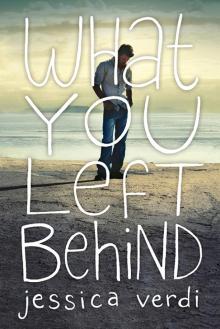 What You Left Behind
What You Left Behind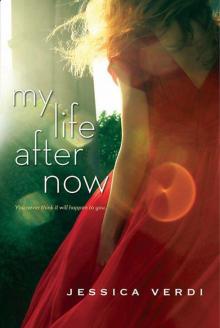 My Life After Now
My Life After Now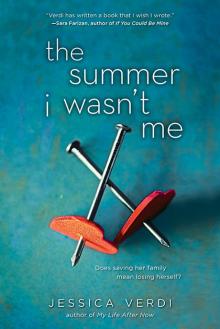 The Summer I Wasn't Me
The Summer I Wasn't Me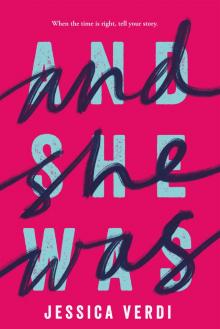 And She Was
And She Was